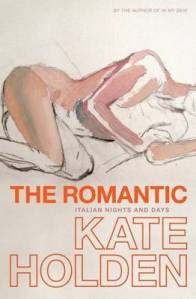I adore Kate Holden and have great admiration for her and her writing. Her fortnightly columns in Saturday Age and her musings on her website are filled with wit and a wry sense of humour. I also loved her first autobiography In My Skin.
 So it really pains me to say that her second autobiography left me quite disappointed. The Romantic follows up after the seemingly ‘happily ever after’ in the first book where Kate kicked her heroin addiction, left her job as a prostitute and finally got herself sorted enough to get on a plane and leave for Italy and to make a clean break. (Note: you don’t need to have read the first book in order to understand the second). In Italy, Kate, now twenty-nine, roams listlessly between Rome and Naples and have a long string of affairs. The book is basically a description of her string of affairs and sexual escapades in Italy. She wanders through the sights, learns some Italian, writes in her diary and reads the romantic poets in her spare time.
So it really pains me to say that her second autobiography left me quite disappointed. The Romantic follows up after the seemingly ‘happily ever after’ in the first book where Kate kicked her heroin addiction, left her job as a prostitute and finally got herself sorted enough to get on a plane and leave for Italy and to make a clean break. (Note: you don’t need to have read the first book in order to understand the second). In Italy, Kate, now twenty-nine, roams listlessly between Rome and Naples and have a long string of affairs. The book is basically a description of her string of affairs and sexual escapades in Italy. She wanders through the sights, learns some Italian, writes in her diary and reads the romantic poets in her spare time.
The book is divided and titled on the man Kate is happening to have an affair or sex with. There is Jack, a married man twice her age; Guido, a cheeky hotel worker; Massimo, Guido’s cheekier and charismatic brother; Rufus, a writer; Gabriele, a charming, hardworking and sweet Italian man; Donetella, a woman who gets entangled with Kate and Gabriele; and finally, Kate alone. There is a lot of sex. Kate likes sex, that point is clear, but there seems to be very little character development and the pacing stumbles with its aimlessness, perhaps intentional to capture Kate’s own feeling of aimlessness. There is also the struggle within Kate as she tries to distinguish herself between the Prostitute Kate and Clean Kate. Men seem to fall instantly in love with Kate and she does not discourage them. In being with so many different men and giving herself so easily and freely, it seemed like she was trying to find acceptance somehow and a place for her somewhere, anywhere, in society although almost all the men Kate was with were all unavailable one way or another.
In a moment he’s gone. She watches them drive away. This is the city where they met; they have said goodbye here before.
‘You are in my heart,’ he had said.
‘You are my heart,’ she replied.
But her heart is gone. She was always trying to give it away. – p. 233
Despite being let down by the book, the writing is beautiful even when the content is crude. The whole idea of identity is at play here (as it tends to be when a book is an autobiography!) and Kate really loses and distances herself as she refers to herself in third person in the book as if to point out that the Kate then is not the Kate now.